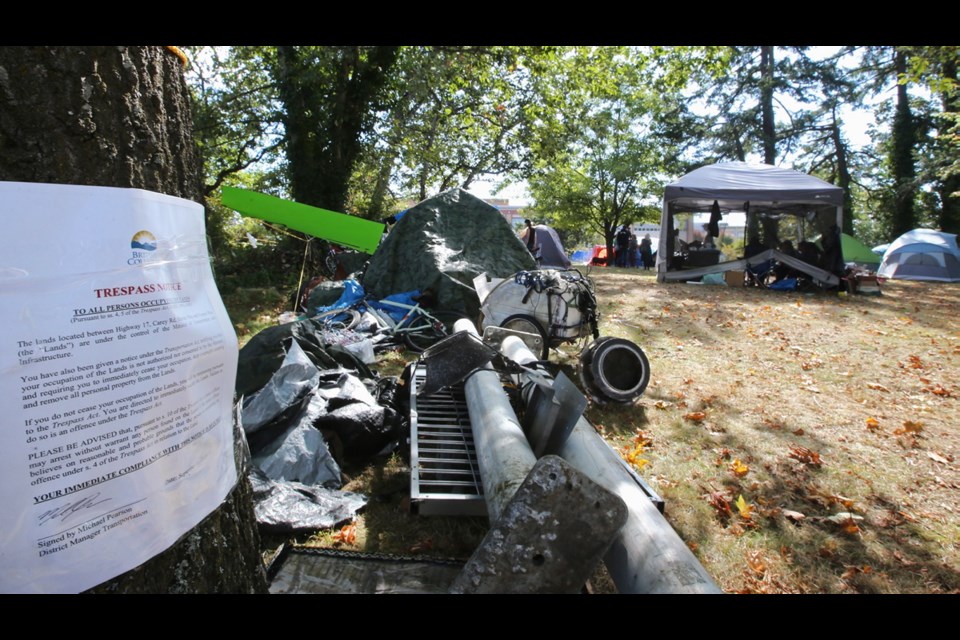The province is asking Saanich police to enforce the Trespass Act and move residents from a new tent city near Ravine Way to a safer location.
On Sunday, the province issued a trespass notice ordering people camping on the green space between Highway 17, Carey Road, Ravine Way and Vernon Way to immediately stop overnight camping and remove all personal property from its lands.
The trespass notice, issued under the Transportation Act, is posted on trees around the encampment. The notice warns campers they may be arrested without warrant if a police officer believes they are committing an offence under the Trespass Act.
“The safety of campers is our first priority and, as a judge recently ruled, highway land is not a safe place for people to be camping,” says a statement from the Ministry of Municipal Affairs and Housing.
“In the interests of safety, police will be asking campers to vacate immediately. Provincial outreach staff will assist campers who need help moving and with housing needs assessments.”
Campers arrived at the site on Friday.
On Monday, there were 28 tents and 42 people, most of whom are former residents of a five-month-long homeless camp in Regina Park. That camp was shut down Thursday when Saanich police officers enforced a B.C. Supreme Court injunction, forcing more than 100 campers to relocate.
Because it’s on provincial land, the Ravine Way encampment is exempt from a Saanich bylaw which permits camping in 102 designated municipal parks between 7 p.m. to 9 a.m.
On Monday, as a temporary solution, the ministry announced it will give people earlier access to safe shelter spaces by opening a 25-bed shelter at the Victoria Native Friendship Centre from Oct. 1, 2018 to March 31, 2019 between 9 p.m. and 7:30 a.m.
“This is normally an extreme-weather shelter location, but it is being opened early due to urgent need. The friendship centre will provide shuttle services from pre-determined pick-up points, meals, showers and access to laundry facilities on-site,” says a government statement.
The government has expanded services in response to the urgent need for shelter spaces in Saanich and Victoria, it says. In addition, B.C. Housing is working with non-profit partners to expedite the opening of other winter shelters. Outreach teams will continue to help people with housing and support services.
Camp spokesperson Chrissy Brett said the expanded shelter capacity is not meaningful, culturally safe or sensitive.
“It’s just a way the government can save face by offering them 25 mats, not homes, not rooms, just mats, like sardines on the floor,” she said. “People need more than a rubber mat. They need a sense of belonging.”
Twenty-five beds doesn’t address the long-term needs of the campers at Ravine Way or the 1,500 people who are homeless in Greater Victoria, she said.
Her group has sent a letter to the province and the municipality suggesting mediation, rather than an expensive court process to address the situation, said Brett.
“Put those dollars towards housing, support services and funding that will help get people off the street. Stop suing people who have absolutely nothing and come to our table for discussion. If you didn’t take us to court, there would be way more money for shelter beds across B.C.”
The camp is cordoned off by ropes to prevent people from camping too close to the roads. A sign with the words “Homes Not Hate” is posted at the entrance.
Retired abuse counsellor Cathy Catterall, who lives in the neighbourhood, decided to contact Brett after seeing the media coverage she has received.
“Maybe if people reached out more, they’d realize they shouldn’t fear the encampment as much as they do. I just wanted to know what’s going on with people’s lives and what got them here,” said Catterall, who sat down with Brett and other campers.
“It seems there’s a lot of anger online. I hope they can all get housing. The weather’s changing. ... I had my bedroom window open last night and I woke up frozen this morning.”
Tent city residents Lynne Hibak and her partner Blair Este said they haven’t had proper housing since they were “renovicted” from their apartment two years ago. Hibak, who is on disability, found housing at the Rock Bay shelter. Este was sleeping on the street or in a shelter if he could.
“It’s just been an awful experience in the shelters,” said Este. “We broke up twice.”



